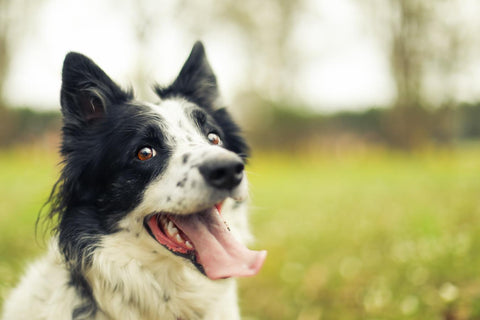Blaming your farts on the dog is a classic technique used by pet parents around the world. But what if your dog really does have gas? Here are some things you can do about it.
Key Takeaways
- Farting in dogs is totally normal, and is a natural result of the digestive process.
- Gas can also be caused by swallowing air, and some breeds are more susceptible to this than others.
- If your dog is farting far more than usual, or their farts are smellier than usual, there might be something you need to address.
- In the short term, consider giving your dog a probiotic — colostrum is a great choice — or treating them to a gentle massage.
- Long-term solutions include diet changes and exercise.
See Related: How to Calm Down a Cat in 5 Simple Steps
Why Dogs Fart
Ah, the humble fart. Passing gas has been a mainstay of crude humor for thousands of years. It also happens to be the bane of many a pet owner.
Dogs, much like humans, occasionally fart. They do so for the same reason: to expel gas from the body.
Gas can build up inside your dog's body for a few reasons. First, the doggy digestive system produces carbon dioxide when breaking down food. Other gases are also released by bacteria in your dog's digestive tract.
Dogs also occasionally swallow air. This often happens when they're eating or drinking.
All that gas has to go somewhere! It's expelled by burps or farts.
Well, you know what they say: Better out than in.
But is that always true? Anyone who's had to suffer the smell of a particularly noxious fart knows just how annoying they can be. And excessive gas can actually be a sign that something is up with your furry friend.
The good news is you don't have to suffer in silence. There are plenty of ways you can help your furry friend cut back on their excessive farting. By doing so, you'll also be helping yourself!

How Much Farting Is Too Much?
The first thing you have to do is determine whether your dog's gas is unusual or not.
Remember, everyone farts. It's entirely normal for your dog to have gas.
Exactly how much gas is normal is a little trickier to determine. One study found that dogs had between 9.9 and 13.5 "episodes of flatulence" every day.¹
That might sound like a lot. But plenty of farts can go largely unnoticed. And your furry friend might be farting up a storm while you're not around.
Indeed, another study found that roughly 9% of dog owners reported that their dog farted at least once per day.² That means the vast majority of pet parents don't seem to notice their dog farting often.
Another study basically concluded that dogs vary.³ Some might fart more than others, and that's totally natural. Just like humans!
The crucial thing, then, is to look for change. If your dog never seemed to have gas, but is suddenly stinking up every room, that's a sign that something might be wrong.
Similarly, if your gassy dog's farts suddenly become much stinkier, you might want to take action.

Causes of Excessive Gas
Pinning down the exact culprit of your dog's gas can be a little tricky. In general, three things can contribute to gas in dogs.
Diet
The first place to look is your dog's food.
Have you changed your dog's diet recently? New foods can cause an increase in gas. Perhaps you could switch back to what you fed your dog before.
If that's not possible, consider whether your dog might be sensitive to a particular ingredient. By eliminating that ingredient, you might be able to solve your dog's farting problem.
There are also certain foods that generally might cause more farting. One study found that soya hulls caused increased gas in dogs.⁴ Another found that soybean meal caused farts to smell much worse when compared to other diets.⁵
However, a third, separate study found no difference in dog flatulence when comparing soy diets with non-soy diets.⁶
In general, low-quality diets are likely to cause more farting than high-quality diets.
However, identifying a high-quality diet can be tricky. Cost is not always a good indicator.
In one study, more expensive foods were not necessarily more digestible.⁷ Actually, the most digestible food tested was relatively cheap. What correlated better was crude fat content, perhaps because more crude fat in a dog's food meant fewer fart-causing ingredients.
Still, sometimes the issue isn't with the food itself. You might feed your dog nothing but the best, and yet still have to cover your nose to save yourself from smelly gas.
If that's the case, you might want to consider adding a gut health supplement to your dog's diet. Our Colostrum for Dogs and Cats, for example, helps support proper digestion and bowel health.
Air
Sometimes, poor digestion isn't the culprit. Your dog might have perfect digestive health and still fart up a storm.
If that's the case, your furry friend might simply be swallowing too much air.
As we mentioned, swallowing some air is normal. Too much, though, can cause excess gas.
This generally isn't an issue with most dogs, but certain breeds are more susceptible to swallowing too much air. Pugs, Shih Tzus, Boston Terriers, and other dogs that have flat or short noses tend to swallow more air when they drink or eat.⁸ That can lead to gassy dogs!
Bonus: How to Calm a Panting Dog: 3 Tips & Tricks

Size
The third thing to consider is your dog's size. Overweight dogs are more likely to have excessive gas and/or bad gas, no matter the quality of their diet.
How to Deal With a Farting Dog
We've covered some potential causes of your dog's excess gas. The question remains: What can you do about it?
First, let's cover some short-term solutions.
Prebiotics & Probiotics
One of the best places to start is with prebiotics and probiotics. Research on humans shows that probiotics can reduce farting both in the short and long-term.⁹
Prebiotics, in particular, help the gut build up its “good” bacteria and support a healthy microbiome. This is what allows your body to break down food and absorb nutrients. Slow feeders and bowls slow the rate of ingestion, which can improve nutrient absorption.
We've already mentioned colostrum, a superfood that combines prebiotics and probiotics. Colostrum also contains IgG, which can also improve nutrient absorption and lead to less-gassy pets!
Our colostrom supplements combine grass-fed bovine colostrum with hemp extract and blueberry powder to support healthy digestion. The exact amount you give your dog depends on their size. That's why we've got a smaller and larger size!
Research suggests CBD could help support healthy digestion, too.¹⁰ A great option is our CBD Oil for Pets.
Supplements
Probiotics and CBD are great options for helping support your dog's digestive system, but they aren't your only options. Various other supplements might aid your fight against flatulence.
One study, for example, found that activated charcoal helped reduce the amount of hydrogen sulfide emitted by dogs.¹¹ Hydrogen sulfide is the gas responsible for the rotting egg odor that can make farts so unpleasant on the nose.
Bath Time

Supplements might take some time to get working. But sometimes us dog parents need solutions to farting fast.
One technique is a warm bath. The heat might help your dog's digestive system, getting things moving and promoting normal digestion.¹²
Massage
Another technique is a gentle massage. You can actually do this in the bath if you want to combine both methods.
For some massage techniques specifically intended to help with doggy farting, check out this guide.
Long-Term Strategies to Avoid Excessive Gas
These short-term solutions might help with your dog's farts. But the best gas relief is ensuring excess gas doesn't build up in the first place!
No, seriously. Dog owners should be aware of what their dog eats from day one. Research shows that a puppy's diet can have long-term effects on their digestive health, including their propensity for farting.13
Adding probiotics to your dog's diet can be a great long-term method for promoting proper digestion and avoiding dog flatulence. But it's far from the only thing you can do.
No More Table Scraps
Look, we get it. Those puppy dog eyes are hard to resist. But you have to try!
Sneaking scraps under the table might be the cause of your dog's gas. Especially if those scraps are low-quality foods or food items that often cause farting.
That's a key distinction. At least one study found that table scraps can actually help with farting, as long as those scraps are things like raw bones and berries.¹³
On the other hand, many dogs are sensitive to cow milk.¹⁴ Cutting dairy products out of your dog's diet might help with their farting issue.

Secure Your Trash
If your dog isn't being fed at the table, but they're still farting like crazy, you might have a trash bandit on your hands.
We've all had to restrain our dogs from gobbling up food waste. Our furry friends might act like a particularly disgusting bit of trash is the tastiest thing they've ever seen, but don't let them follow through with their trash-tasting tendencies.
Avoid Flatulence-Causing Foods
Even high-quality foods can cause flatulence. Steamed veggies like broccoli and brussel sprouts, for example, might be the cause of your dog's gas. Too much red meat can also cause overly smelly farts.
Slim Things Down
Remember, excess weight often leads to excess gas. Of course, ensuring your dog is a healthy weight is important for your dog's health in general.
Cutting out table scraps and sticking to a healthy diet can help slim your pup back down if they've put on excess pounds.
Get Outside
Interestingly, one study found that more active dogs farted less than less active dogs.¹⁵
What does this mean? Well, get that dog outside!
You likely already knew that exercise is important for your dog's health. But now you know it can help relieve gas issues, too!
Make Sure They Chew
Dogs do love their food. So much so that they sometimes forget to chew when eating it.
We might find that hilarious. Our dog's stomach, however, might not see the funny side.
Remember, dogs can swallow air when eating. If they're gulping and gasping as if they've never eaten before, they might end up swallowing more air than they would otherwise.
Additionally, research suggests that swallowing larger food items, which necessarily happens when not chewing enough, can cause gassiness.¹⁶
One solution is a slow feeding dish. There are all kinds of designs out there, but the principle is the same in all of them: By forcing your dog to eat slower, you can help promote normal digestion.
Another thing to consider is how many meals you give your dog. In one study, dogs given the same amount of food in two separate meals farted less than dogs fed just once.¹

Conclusion
While farting is natural, doggy flatulence that is excessive in volume, frequency, or stench is not something you have to live with. One of the best solutions is probiotics to promote healthy digestion; also important are your dog's food, weight, and activity levels.
If none of these techniques work, don't give up. Remember, excessive gas can be a sign that something is wrong.17 Go see your vet, who'll be able to help you find a solution to your furry friend's farting!
Keep Reading: Can CBD Help Dogs Stop Scratching?
Sources
- In vivo measurement of flatulence and nutrient digestibility in dogs fed poultry by-product meal, conventional soybean meal, and low-oligosaccharide low-phytate soybean meal
- Beynen AC, 2018. Diet and dog farts
- Development of a technique for the in vivo assessment of flatulence in dogs - PubMed
- Effect of soya hulls on diet digestibility, palatability, and intestinal gas production in dogs - ScienceDirect
- In vivo measurement of flatulence and nutrient digestibility in dogs fed poultry by-product meal, conventional soybean meal, and low-oligosaccharide low-phytate soybean meal
- In vivo measurement of flatulence and nutrient digestibility in dogs fed poultry by-product meal, conventional soybean meal, and low-oligosaccharide low-phytate soybean meal - PubMed
- Evaluation of eight commercial dog diets - PMC
- Flatulence in Dogs
- Effective Management of Flatulence | AAFP
- Cannabidiol and Intestinal Motility: a Systematic Review - PMC
- Flatulence in dogs: Annoyance or sign of GI illness?
- Effectiveness of Heat Application on Gastric Variables Among Patients With Nasogastric Tube Feeding Admitted in the Intensive Care Units at a Selected Hospital
- The effect of puppyhood and adolescent diet on the incidence of chronic enteropathy in dogs later in life | Scientific Reports
- IgE reactivity to milk components in dogs with cutaneous adverse food reactions - PMC
- Flatulence in pet dogs - PubMed
- Effects of Chewing Time on Gastrointestinal Discomfort, Substrate Use, and Performance During Running
- Risk Factors for Canine Bloat
–
Earth Buddy is an environmentally conscious and family-owned company dedicated to providing natural solutions for pets. From our CBD oils to our colostrum supplements, our products are designed to promote calmness and encourage relaxation for our furry friends. To learn more and stay connected, follow us on Facebook, Instagram, LinkedIn, YouTube, and Pinterest.






Comments (0)
There are no comments for this article. Be the first one to leave a message!